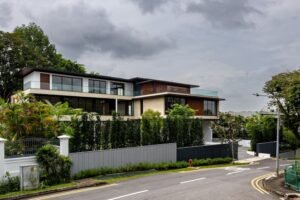GRAB co-founder and CEO Anthony Tan’s family has bought a property in the Bin Tong Park Good Class Bungalow (GCB) Area for S$40 million. The purchase was made by his wife, Chloe Tong, BT understands.
The couple is expected to redevelop the property, which has a bungalow on site understood to have been built in the 1990s.
The property was sold by a doctor. The price works out to S$1,849 per square foot based on the freehold land area of 21,637 sq ft. The deal was entered into a few months ago and has been completed.
Mr Tan, 39, is a Malaysia-born Singapore citizen and a scion of the Tan Chong Motor family but struck out on his own to co-found Singapore-based ride-hailing and food delivery startup Grab.
He married Ms Tong, the daughter of The Edge Media Group owner Tong Kooi Ong, in 2015.
Some observers described the nearly S$1,850 psf that Ms Tong had paid for the Bin Tong Park property as a “fair price” when the deal was entered into a few months ago.
“If the property were to be sold today, the price would be higher, maybe S$2,000 psf,” said a veteran bungalow market watcher.
News in March of the sale of an old Nassim Road house for S$4,005 psf – a record price for bungalow redevelopment land in a GCB Area – is seen as the catalyst that emboldened sellers to be firm about their asking prices. Well-heeled Singapore citizens house hunting in GCB Areas have been willing to match higher asking prices.
The price appreciation has rippled from the ultra-prime locations such as Nassim and Cluny which are closest to the Singapore Botanic Gardens to areas further away.
Based on URA Realis caveats data, there have been 53 deals in GCB Areas totalling nearly S$1.5 billion in the first-half of this year. This exceeds the tally for the whole of last year – 46 deals amounting to S$1.1 billion.
Bungalows in the 39 gazetted GCB Areas are the most prestigious form of landed housing in Singapore, with strict planning conditions stipulated by the Urban Redevelopment Authority (URA) to preserve their exclusivity and low-rise character.
One generally has to be a Singapore citizen to be allowed to acquire a landed property in a GCB Area.
Mr Tan started Grab, then known as MyTeksi, with his Harvard Business School classmate Tan Hooi Ling (no relation) in 2012. The company began as a taxi-hailing business in a cramped Kuala Lumpur office with Mr Tan’s mother as its first external investor.
Vertex Ventures, a venture capital firm linked to Singapore state investor Temasek, funded the startup in 2013 and Grab later moved its headquarters to Singapore. It diversified its business into transport, food delivery and financial services.
The company’s valuation climbed over the years as it snagged backing from SoftBank, Toyota, Tiger Global and other investors. Its last known private market valuation is understood to be more than US$16 billion.
A US$39.6 billion merger with US-listed SPAC (special purpose acquisition company) Altimeter Growth, announced in April this year, will likely push Mr Tan’s net worth to US$829 million, according to the Bloomberg Billionaires Index.
Last month, Grab postponed the merger, which had been slated for completion this month, to the fourth quarter of this year.
The delay in the deal – poised to be the biggest merger with a SPAC to date – came as Grab works on a financial audit of the past three years to comply with standards required by the US Securities and Exchange Commission.
BT reported earlier that according to information in Grab’s presentation, Mr Tan will control 60.4 per cent of Grab’s voting power after the SPAC merger, thanks to a dual-class structure that will grant the co-founder disproportionate voting rights.
He would own a 2.2 per cent stake in the company post-merger, comprising 162.9 million Class B ordinary shares. Each Class B share is entitled to 45 votes, in contrast with the one vote accorded to each Class A share.
Grab recorded a net loss of US$2.7 billion in FY2020 ended December, on the back of US$1.2 billion in net revenue (gross billings less base and excess incentives). This marked an improvement from the US$4 billion loss in FY2019, with US$455 million recorded in net revenue.
The delivery segment was the main driver of revenue growth, likely boosted by the Covid-19 pandemic. Adjusted net revenue (gross billings less base incentives) rose from US$0.2 billion to US$0.8 billion in 2020.
Source: The Business Times




